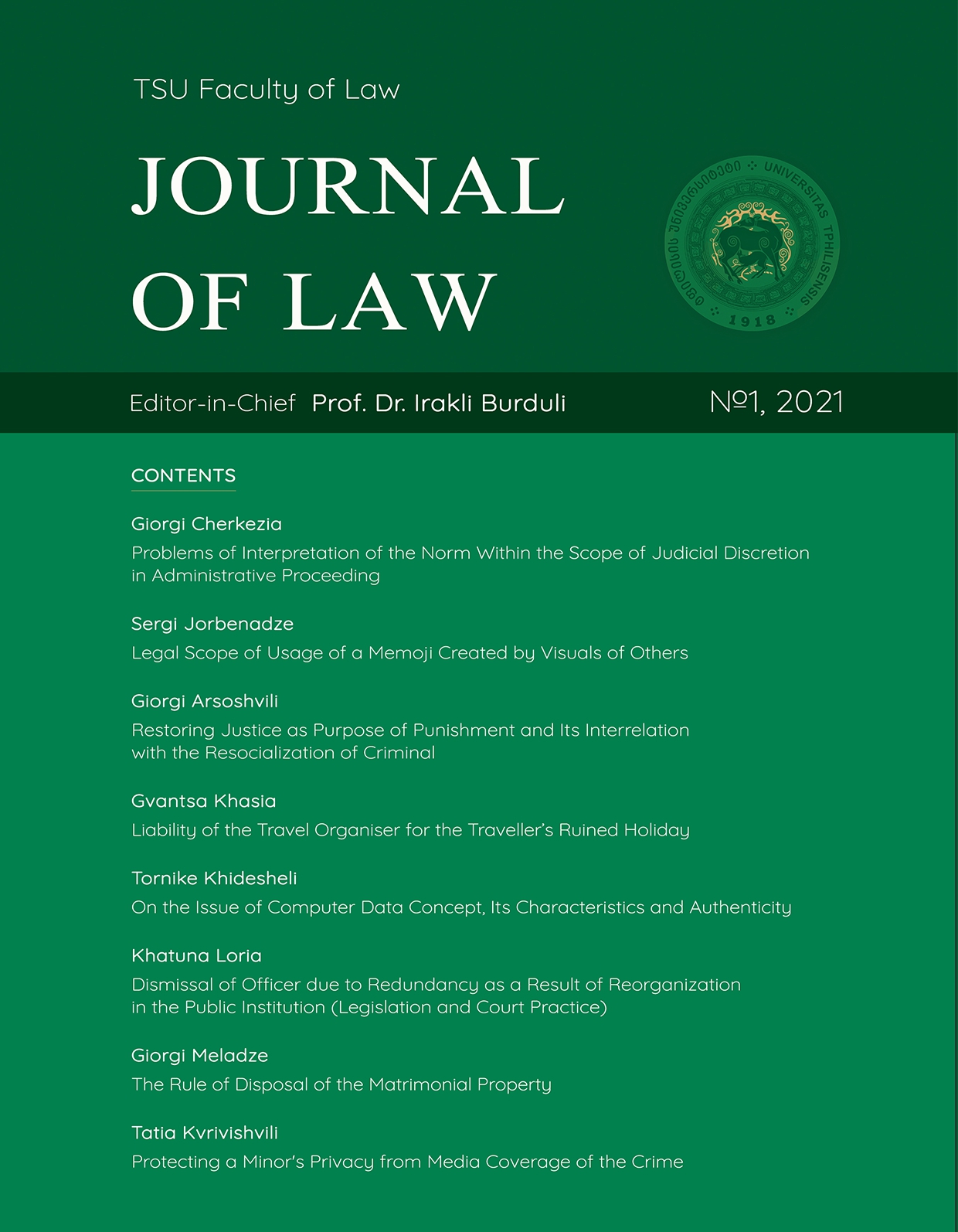Problems of Interpretation of the Norm Within the Scope of Judicial Discretion in Administrative Proceeding
DOI:
https://doi.org/10.60131/jlaw.1.2021.3342Keywords:
General Administrative Code of Georgia, court discretion, norm definition.Abstract
The issue of discretion of the administrative body is one of the vaguest and explanatory issues, which in turn is bound by the boundaries set by the law.[1]
According to the General Administrative Code of Georgia, Article №2, paragraph “K”: powers granting freedom to an administrative body or official to choose the most acceptable decision out of possible decisions under the legislation, to protect public or private interests. According Article № 6: If an administrative body is granted discretionary powers to resolve any issue, it shall be obliged to exercise the powers within the scope of the law. An administrative body shall be obliged to exercise discretionary powers solely for the purpose of exercising the powers that they have been granted. Acting in the frame of discretion it must not restrict rights and obligations of society.[2]
The main idea of this research is not to determine how administrative body issues the administrative acts in the frame of discretion, but the court itself, at the stage of exercising discretionary powers and what it might be the definition
[1] Morstein M., Comparative Administrative Law: A note on Review of Discretion, University of Pennsylvania Law Review and American Law Register, Harrisburg, 1999, 973.
[2] Toradze D., Responsibility in Exercising Public Powers towards other Persons on the Examples of Georgian and German Administrative Law, Tbilisi, 2019, 53 (in Georgian).
References
General Administrative Code of Georgia, LHG, 32(39), 25/06/1999.
Administrative Procedure Code of Georgia, LHG, 39(46), 23/07/1999.
German Administrative Procedure Code, 11/06/1946.
Arthur S., Michigan Law Review, Administrative Discretion in the Award of Federal Contracts, Vol. 53, 817.
Bufford, S., Defining the Rule of Law, Judge’s Journal, Vol. 46, Issue 4, 2007, 15.
Bikle W., Administrative Discretion, George Washington Law Review, Vol. 19, 1933, 2.
Blach E., Interpretation of Law, Marquelle Law Review, Vol. 16, 1932, 107.
Frank J., Kentucky Law Journal, Law Review, Law Review, 1918, 326.
Giorganashvili K., Error in Exercising Discretionary Powers, Administrative Law Scientific-Popular Journal, № 1, 2013, 31 (in Georgian).
Goodnow F., Private Rights and Administrative Discretion, American Bar Association Journal, Vol. 6, 1918, 789.
Harvey P., Administrative Discretion and the NLRB, Vol. 18, № 2, 280.
Isaacs N., The Limits of Judicial Discretion, The Yale law journal, Vol. 32, 1923, 340.
Jeffrey P., Principles Governing the Court’s Discretion to Extent time, Singapore Academy of Law Journal, Vol. 25, 1999, 1.
Khubua G., Theory of Law, Tbilisi, 2004, 156 (in Georgian).
Khoperia R., Control of the Decision Made by Administrative Body within the Discretion, Iv. Javakhishvili Tbilisi State University, Faculty of Law, Dissertation, Tbilisi, 2019 13 (in Georgian).
King A., On Court Rates, Law Magazine, or Quarterly Review of Jurisprudence, Issue 2, 1830, 351.
Lurigio A., Putting Therapeutic Jurisprudence into Practice: The Growth, Operations, and Effectiveness of Mental Health Court, Justice System Journal, Vol. 30, Issue 2, 2009,196.
Mosulishvili M., Explanation of the Rule of Law-Faces, Methods, Acts, Grigol Robakidze University, Academic Herald, Tbilisi, 2015, 56 (in Georgian).
Morstein M., Comparative Administrative law: A note on Review of Discretion, University of Pennsylvania Law Review and American Law Register, Harrisburg, 1999, 973.
Maurice F., Judicial Self-Limitation, Harvard Law Review, Vol. 37, 1923-1924, 338.
Zaiets A., Problems of the Definition of Law Topic of the Issue: The Legal System of Ukraine: Topical Issues of Theory and History: Section I: Peculiarities and Developmental Trends of the Legal System of Ukraine, Law of Ukraine, Kyiv, 2013, 23.
Toradze D., Responsibility in Exercising Public Powers Towards other Persons on the Examples of Georgian and German Administrative Law, Tbilisi., 2019, 53 (In Georgian).
Decision of October 10 2010, case № BS-739-714 (K-10), Supreme Court of Georgia.
Decision of July 22, 2010 case № BS-534-514(K-10), Supreme Court of Georgia.
Council of Europe, Committee of Ministers, Recommendation №R (80) https://search.coe.int/cm/Pages/result_details.aspx?ObjectId=09000016804f22ae [25.06.2021].
Smith M., Decision Making by Public Bodies: How to Avoid Legal Challenge, London, 2008, https://www.fieldfisher.com/en/insights/decision-making-by-public-bodies-how-to-avoid-legal-challenge [22.06.2021].
Legal dictionary https://gil.mylaw.ge/ka/term/879.html [25.06.2021] (in Georgian).
Downloads
Published
How to Cite
Issue
Section
License

This work is licensed under a Creative Commons Attribution-ShareAlike 4.0 International License.









